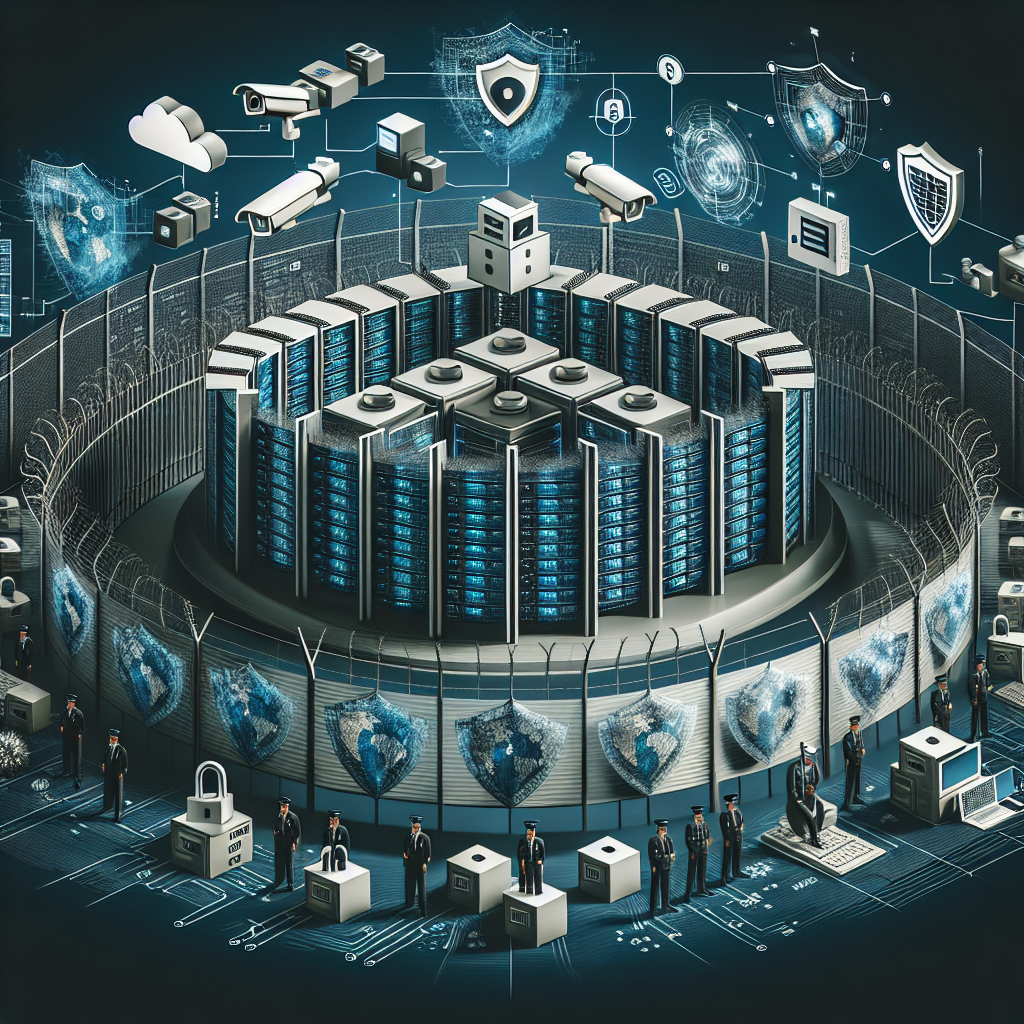Your cart is currently empty!
Tag: data center security and compliance

Data Center Security: Building a Strong Defense Against Cyber Threats
As technology continues to advance and businesses rely more heavily on digital infrastructure, data center security has become a top priority for organizations looking to protect their sensitive information from cyber threats. With the rise of sophisticated cyber attacks and data breaches, it is crucial for companies to build a strong defense against these threats in order to safeguard their data and maintain the trust of their customers.Data centers are the heart of any organization’s IT infrastructure, housing critical data and applications that are essential for the day-to-day operations of the business. As such, they are a prime target for cyber criminals looking to steal valuable information or disrupt operations. In order to protect against these threats, organizations must implement a comprehensive security strategy that addresses both physical and digital security measures.
One of the first steps in building a strong defense against cyber threats is to secure the physical infrastructure of the data center. This includes implementing access controls, surveillance systems, and environmental controls to prevent unauthorized access and protect against physical threats such as theft or vandalism. By limiting access to only authorized personnel and monitoring activity within the data center, organizations can reduce the risk of a security breach occurring.
In addition to physical security measures, organizations must also implement robust digital security measures to protect against cyber threats. This includes implementing firewalls, intrusion detection systems, and encryption technologies to prevent unauthorized access to the network and data stored within the data center. Regular security audits and penetration testing can also help identify and address vulnerabilities before they can be exploited by cyber criminals.
Furthermore, employee training and awareness programs are essential in building a strong defense against cyber threats. Employees are often the weakest link in an organization’s security posture, as they may inadvertently click on malicious links or disclose sensitive information to unauthorized individuals. By educating employees on best practices for identifying and reporting suspicious activity, organizations can reduce the risk of a security breach occurring.
In conclusion, data center security is a critical component of any organization’s overall security strategy. By implementing a comprehensive security strategy that addresses both physical and digital security measures, organizations can build a strong defense against cyber threats and protect their sensitive information from falling into the wrong hands. With the increasing sophistication of cyber attacks, it is more important than ever for organizations to prioritize data center security and take proactive steps to safeguard their data and maintain the trust of their customers.

Understanding Data Center Compliance: How to Meet Industry Standards
Data centers are the backbone of modern businesses, housing critical IT infrastructure such as servers, storage, and networking equipment. In order to ensure the security and reliability of these systems, data center compliance with industry standards is essential.Data center compliance refers to the process of adhering to a set of regulations and guidelines established by industry organizations and government agencies to ensure the security, privacy, and integrity of data stored in the facility. This includes compliance with standards such as the Payment Card Industry Data Security Standard (PCI DSS), the Health Insurance Portability and Accountability Act (HIPAA), and the Sarbanes-Oxley Act (SOX), among others.
Meeting industry standards for data center compliance is crucial for businesses of all sizes, as failure to do so can result in data breaches, financial penalties, and damage to reputation. In order to maintain compliance, data center operators must implement a comprehensive set of security measures and protocols to protect sensitive data and ensure the availability of critical systems.
One of the key aspects of data center compliance is physical security. This includes measures such as access control systems, video surveillance, and security guards to prevent unauthorized access to the facility. Additionally, data centers must have robust environmental controls in place to protect equipment from power outages, temperature fluctuations, and other risks.
In terms of IT security, data centers must implement encryption, firewalls, intrusion detection systems, and other technologies to protect data from cyber threats. Regular security audits and vulnerability assessments are also essential to identify and address potential weaknesses in the system.
Another important aspect of data center compliance is data management and retention. Data centers must have policies and procedures in place for securely storing and disposing of data, as well as for ensuring data integrity and availability. This includes regular data backups, disaster recovery plans, and data retention schedules to comply with legal and regulatory requirements.
In order to meet industry standards for data center compliance, businesses should work with trusted data center providers that have a proven track record of compliance and security. These providers should have certifications such as ISO 27001, SOC 2, and PCI DSS, as well as a comprehensive set of security measures in place to protect data and ensure compliance with industry regulations.
Overall, understanding data center compliance is essential for businesses that rely on data centers to store and manage critical IT infrastructure. By implementing robust security measures, physical controls, and data management policies, businesses can ensure the security and integrity of their data and meet industry standards for compliance. Working with reputable data center providers is key to achieving and maintaining compliance in today’s complex and evolving regulatory environment.

The Importance of Data Center Security in the Digital Age
In today’s digital age, data centers play a crucial role in storing and managing vast amounts of information for businesses, governments, and organizations of all sizes. With the increasing reliance on technology and the rise of cyber threats, ensuring the security of data centers has become more important than ever.Data center security refers to the measures and protocols put in place to protect the physical and virtual infrastructure of a data center from unauthorized access, theft, and cyber attacks. This includes implementing robust security systems, access controls, monitoring tools, encryption, and security policies to safeguard sensitive data and prevent data breaches.
One of the primary reasons why data center security is so crucial in the digital age is the sheer volume of data that is stored and processed within these facilities. From financial records and customer information to intellectual property and trade secrets, data centers house a wealth of valuable and sensitive data that can be targeted by cybercriminals looking to steal, manipulate, or destroy it.
A data breach can have devastating consequences for a business, leading to financial losses, reputational damage, legal repercussions, and loss of customer trust. In some cases, data breaches can even threaten national security and public safety, making data center security a top priority for organizations across all sectors.
Furthermore, with the increasing complexity of cyber threats and the evolving tactics used by hackers, data center security must constantly adapt and improve to stay ahead of the curve. This includes implementing advanced security technologies such as artificial intelligence, machine learning, and behavioral analytics to detect and respond to threats in real-time.
In addition to external threats, data center security also encompasses insider threats posed by employees, contractors, and third-party vendors who have access to sensitive data. By implementing strict access controls, monitoring user activity, and conducting regular security audits, organizations can mitigate the risks associated with insider threats and prevent data breaches from within.
Ultimately, the importance of data center security in the digital age cannot be overstated. By investing in robust security measures, organizations can protect their valuable data assets, maintain the trust of their customers, and ensure business continuity in the face of evolving cyber threats. In a world where data is king, safeguarding it should be a top priority for all organizations that rely on data centers to store and manage their critical information.

Ensuring Data Center Security: Best Practices for Protecting Your Information
In today’s digital age, data is the lifeblood of businesses. From customer information to financial records, companies rely on data to make informed decisions and drive growth. With the increasing amount of data being stored and processed in data centers, ensuring data center security has become a top priority for organizations.Data center security refers to the measures and protocols put in place to protect sensitive information stored in data centers from unauthorized access, theft, or damage. With cyber threats becoming more sophisticated and prevalent, it is crucial for businesses to adopt best practices for protecting their data.
Here are some best practices for ensuring data center security:
1. Implement a multi-layered security approach: A multi-layered security approach involves implementing multiple security measures at different levels to protect data. This includes physical security measures such as access controls, surveillance cameras, and biometric authentication, as well as cybersecurity measures such as firewalls, encryption, and intrusion detection systems.
2. Regularly update and patch systems: Keeping software and systems up-to-date with the latest security patches is essential for protecting data from vulnerabilities and exploits. Regularly updating and patching systems can help prevent cyber attacks and ensure that data remains secure.
3. Conduct regular security audits and assessments: Regular security audits and assessments can help identify potential vulnerabilities in data center security measures. By conducting regular audits, businesses can proactively address security gaps and strengthen their defenses against cyber threats.
4. Implement strong access controls: Limiting access to sensitive data is crucial for data center security. Implementing strong access controls, such as role-based access control and least privilege access, can help ensure that only authorized users have access to sensitive information.
5. Encrypt data in transit and at rest: Encrypting data in transit and at rest can help protect data from unauthorized access and theft. By encrypting data, businesses can ensure that even if data is intercepted or stolen, it remains secure and unreadable to unauthorized users.
6. Backup data regularly: Regularly backing up data is essential for data center security. In the event of a cyber attack or data breach, having backups of data can help businesses recover quickly and minimize the impact of the incident.
7. Train employees on security best practices: Human error is one of the leading causes of data breaches. Training employees on security best practices, such as how to recognize phishing emails and avoid clicking on suspicious links, can help prevent data breaches and ensure that data remains secure.
In conclusion, ensuring data center security is essential for protecting sensitive information and maintaining the trust of customers. By adopting best practices such as implementing a multi-layered security approach, regularly updating systems, and conducting security audits, businesses can strengthen their defenses against cyber threats and safeguard their data. Remember, data security is everyone’s responsibility, and it is crucial for businesses to prioritize data center security in today’s digital world.

